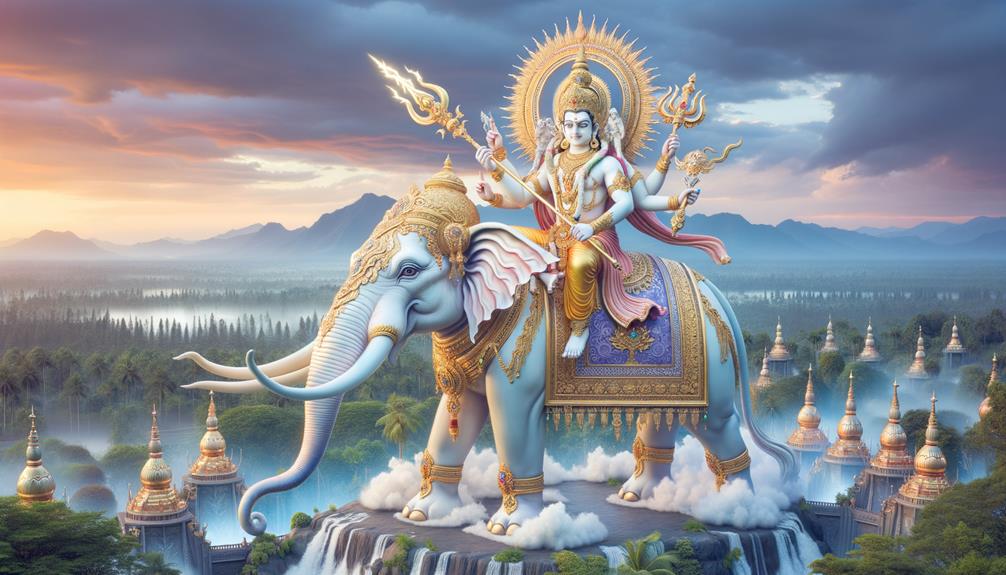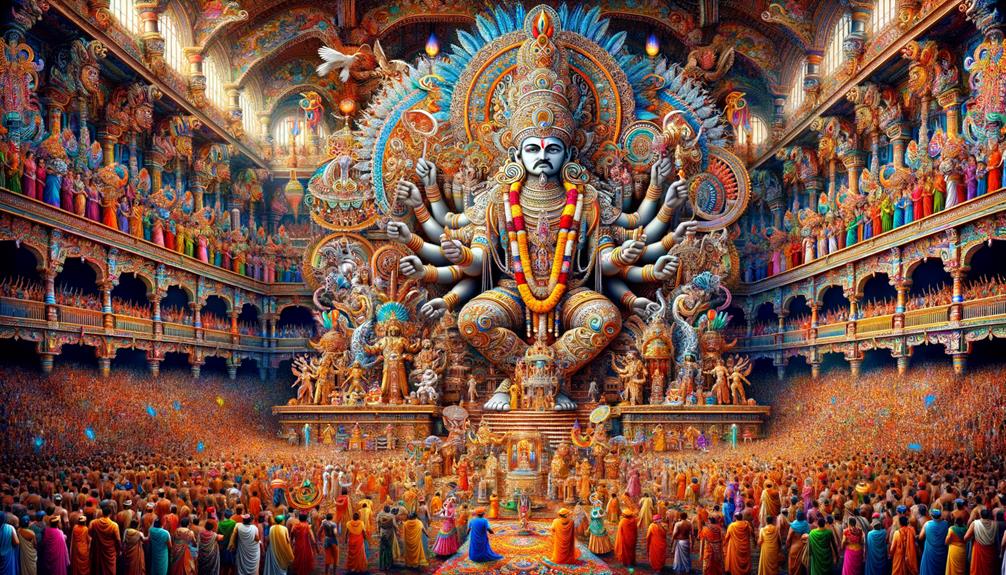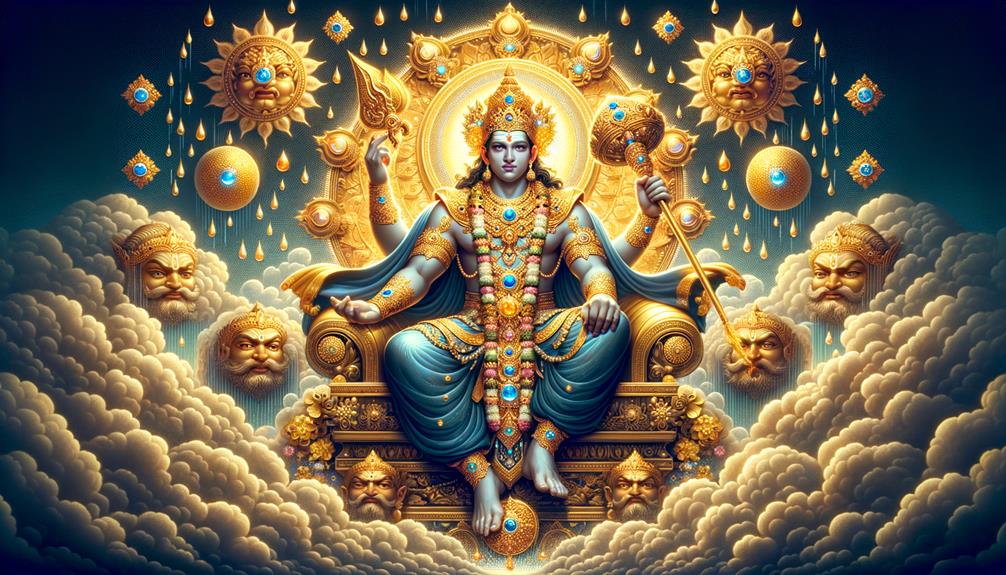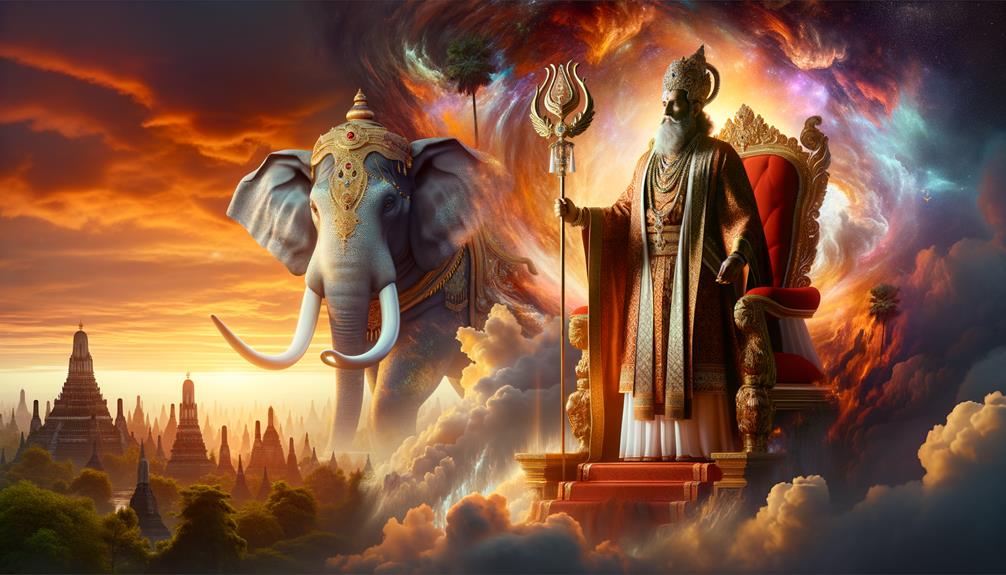Indra: The Intriguing Paradox of the Hindu King of Gods
In the celestial tapestry of Hindu mythology, Indra, the King of Gods, shines with an unparalleled brilliance. Immersing myself in years of study, I've discovered his character to be a mesmerizing kaleidoscope of traits, as intricate as a beautifully designed Mandala.
Indra: A Mighty Warrior and Nurturer in the Heavens
Situated in the celestial sphere, Indra emerges as a dominant force, brandishing his mighty thunderbolt, Vajra, to vanquish foes. Yet, this Hindu deity isn't solely about brute strength and conflict. Indra's bond with weather, especially his capacity to govern rainfall, underscores his role as a life-giver, a power that fosters life.
Indra's Declining Worship: A Puzzling Contrast
However, an interesting contradiction arises when you consider the diminishing worship of Indra in contrast to his profound grandeur. In the grand scheme of the Hindu pantheon, the reverence for this deity has noticeably waned over the years, painting a compelling paradox that deserves a closer examination.
Indra: A Figure of Grandeur, A Study of Enigma
This enigmatic dichotomy between Indra's magnificence and his receding significance in modern religious observances offers an intriguing field of study that is ripe for further exploration. This paradox serves as a reminder of the complexities within Hindu mythology and encourages us to delve deeper into the understanding of these deities.
In conclusion, Indra, the King of Gods in Hindu mythology, embodies both a powerful warrior and a nurturing force. Despite his grandeur, the mystery surrounding his declining worship presents an enticing puzzle for scholars and enthusiasts alike, making him a symbol of fascination in Hindu mythology.
Indra's Role in Hindu Mythology

Understanding Indra in Hindu Mythology
Indra, an icon of Hindu mythology, stands out as a deity with extraordinary influence and versatility. His role extends beyond his reign as the king of the gods; he's viewed as a controller of weather and warfare, connecting deeply with the religious traditions around him. The remarkable figure known as Vedic Indra is far more than a mere god of thunder or rain.
Indra, The Guardian and Hero
As a guardian of the east, Indra is often at the forefront of cattle raids. His heroic exploits and deeds are celebrated in numerous Hindu myths and legends, underscoring his power and influence.
Yet, as time passes in the narrative of Hinduism, Indra's worship sees a decline. Nevertheless, he remains an influential figure, famously fathering Arjuna – the heroic protagonist in the epic tale of the Mahabharata.
Indra's Complex Nature
Indra's complex love affair with Ahalya, the wife of sage Gautama, illustrates the multi-layered characteristics of Hindu deities, with Indra himself being a prime example. Such narratives further demonstrate Indra's profound influence and the intricate nature of Hindu mythology.
Indra Beyond Hinduism
Interestingly, Indra's impact is not limited to Hinduism. He's also depicted vividly in Buddhist and Jain mythologies, indicating his crucial role in wider religious traditions. This cross-religious depiction of Indra highlights his universality and relevance, thus positioning him as more than just a king of gods in Hindu mythology.
Indra's Enduring Influence
Indra's role and influence have proven to extend far beyond the Vedic era, securing his status in the religious and cultural sphere. His narratives have weathered the test of time, proving him to be an enduring figure within and beyond Hindu mythology.
Iconography of King Indra

Understanding King Indra's Iconography: A Journey into Hindu Mythology
Delving deep into the enigmatic persona and persistent influence of Indra, we now shift our focus on the intricate iconography that adorns this celestial king.
Indra, hailed as the sovereign of Devas in Hindu mythology, is often visually represented in a unique style. The artistic depiction of Lord Indra, steeped in symbolism, mirrors his divine and regal status within the Hindu pantheon. The key aspects painting an image of Indra include:
- Vajra, his weapon, a thunderbolt that signifies his immense power.
- Airavata, his mount, a majestic white elephant, reflecting his noble stature.
- His link with Mount Meru, the divine abode of gods, highlighting his supreme leadership.
These symbols, rooted in profound meanings, encapsulate Indra's strength, dignity, and authority. They embody the power of 86, a number revered in Hinduism, signifying the vibrancy and dynamism of this deity.
By unraveling Indra's iconography, we can thus gain a deeper understanding of his cultural and religious significance in the Hindu tradition, and his undisputed position as the ruler of Devas. This exploration will not only engage readers but also provide a comprehensive view of this fascinating character within Hindu mythology.
Unraveling the Symbolism: Vajra, Airavata, and Mount Meru
Take, for instance, the Vajra, Indra's weapon. More than a mere thunderbolt, it stands as a testament to his formidable power and might. Much like how Thor's hammer is synonymous with his strength in Norse mythology, the Vajra is inseparable from Indra's persona in Hindu tradition.
Similarly, Airavata, the white elephant, is more than just a mount. It epitomizes Indra's nobility and grandeur, akin to how a lion's presence signifies royalty in other cultures.
Lastly, Indra's association with Mount Meru, the dwelling place of gods, underscores his leadership and dominance, much like Olympus's association with Zeus in Greek mythology.
Decoding the Power of 86 in Indra's Iconography
In the context of Indra's iconography, the number 86 carries a profound significance. Revered as an auspicious figure in Hinduism, it embodies the energy and dynamism of this deity, enhancing our understanding of this divine king's influence and impact.
Conclusion: Understanding Indra through His Iconography
Through a thorough exploration of Indra's iconography, we can appreciate the cultural and religious gravity of this deity in the Hindu tradition. It also sheds light on his status as the king of Devas, offering a richer understanding of Hindu mythology.
Indra's Influence in Other Religions
Indra's Impact: A Cross-Religious Exploration
Moving beyond the traditional borders of Hindu mythology, the impact and influence of Indra reverberates powerfully in other religious paradigms such as Buddhism and Jainism. These faiths have embraced and adapted his iconography, attributes, and roles in distinctive and fascinating ways.
Indra in Buddhism
In the expansive universe of Buddhist cosmology, Indra takes on the guise of Sakra or Sakka. He stands as a significant deity, intricately entwined with Vajrapani and tied to the celestial realm of Trayastrimsa Heaven.
Indra in Jainism
Venture into Jain traditions, and you'll discover Indra revered as the monarch of the superhumans. They dwell in the heavenly realm of Svarga-Loka. Indra often features alongside his consort, Indrani, in depictions of joyous and auspicious events.
Here's a brief comparison of Indra's roles in these religions:
| Religion | Indra's Role |
|---|---|
| Buddhism | Sakra, allied with Vajrapani and Trayastrimsa Heaven |
| Jainism | Ruler of the superhumans in Svarga-Loka |
The multifaceted portrayal of Indra in later Hinduism and other traditions contributes to his compelling complexity and importance. It underlines his adaptability across varying religious contexts, elevating his stature as a Supreme Deity.
The influence of Indra, the king of gods, extends well beyond the realm of Hindu mythology. This highlights his enduring legacy across a spectrum of cultural and religious viewpoints dedicated to him. By exploring and understanding these varying perspectives, we can truly appreciate the depth and versatility of this revered deity.
Indra's legacy is not just a tale of mythology. It's a testament to the power of adaptation and interpretation across diverse cultural landscapes. This remarkable journey from Hindu mythology to other religions exemplifies the universal relevance of divine figures and their enduring place in human culture and spirituality.
Worship and Festivals Associated With Indra

Unveiling the Mystique of Indra: Worship and Celebrations in Hinduism
Diving deep into the world of worship and festivals, let's unravel the captivating practices dedicated to Indra, the supreme ruler among Hindu gods. Indra, a central figure in Hindu cosmology, reigns as the deity of fire, rain, and thunderstorms, earning him a special place in the pantheon of Vedic gods.
Rituals and Offerings: Communing with Indra
Devotees often engage in vibrant worship rituals to honor Indra, including the presentation of Soma, a revered immortal elixir. This ceremonial offering serves to placate Indra, further nurturing the bond between the divine and the devotee.
Festive Honors: The Indra Jatra Festival
Witness the awe-inspiring spectacle of the Indra Jatra festival in Nepal, a grand celebration that pays tribute to Indra's crucial role as the rain-bringer and the harbinger of bountiful harvests. The festival brings to life the rich tapestry of Hindu religious observances, offering a mesmerizing display of faith and devotion.
The Rudras: Celestial Warriors of Indra
In expressing their devoutness to Indra, adherents also showcase their admiration for the Rudras (or Maruts). These celestial entities are esteemed as mighty warriors and loyal servants of Indra, adding an intriguing layer to Hindu cosmology.
Airavata: The Majestic Elephant and Indra's Companion
In these celebrations, the elephant Airavata, Indra's trusted mount, holds immense significance. Airavata symbolizes Indra's formidable power and majesty, further elevating the grandeur of these events.
Linking the Divine: Indra and Vishnu
An enticing aspect of Hindu belief posits that Indra is an avatar of Vishnu, thereby magnifying his divine stature. This connection offers us an insightful perspective into the intricate interplay between Indra's worship and the reverence for other Hindu gods.
Cultural Significance of Lord Indra

Eternal Reverence for Lord Indra: A Cultural Phenomenon
Dive into the vibrant world of Hindu mythology, where Lord Indra's cultural value is deeply rooted and all-encompassing. Not only does he represent the force of climate and conflict, he also aligns with well-known Indo-European gods like Zeus and Thor. Indra is regularly called upon to herald rain, reflecting the Vedic tradition where he earns acclaim as the vanquisher of Vritra, the demon of drought.
Indra's Iconic Image: A Symbol of Might and Wisdom
Indra's representation is unmistakable. He's frequently illustrated astride a four-tusked white elephant, a potent emblem of authority and intelligence. Take for instance the intricate storyline revolving around his exchanges with the renowned hero Arjuna. This narrative explores Indra's trials of Arjuna's moral fiber and bravery, often culminating in a chastened Indra who acquiesces and salutes Arjuna's righteousness.
Indra's Influence: Beyond Divinity
Indra's moniker, associated with rain and might, underscores his cardinal role in Hindu mythology. His sway isn't limited to Hinduism, it permeates other religions and mythologies too. His adoration is frequently connected with agricultural prosperity and spiritual enlightenment. Hence, the cultural importance of Lord Indra surpasses his divine duties, shaping societal norms, principles, and convictions.
The legacy of Lord Indra, a name synonymous with rain and strength, offers a fascinating insight into the cultural fabric of Hindu mythology. His role and influence extend beyond the spiritual realm, impacting societal norms and values. Whether it's agricultural prosperity or spiritual guidance, Indra's influence is far-reaching, underscoring his significance in shaping belief systems.
Lord Indra: A Cultural Icon
In the grand scheme of Hindu mythology, Lord Indra's cultural significance is undeniable. His deep-rooted impact on societal norms and values transcends his divine role, making him a cultural icon. His unique representation and the narratives surrounding his character shed light on his integral role in Hindu mythology. The cultural importance of Lord Indra is thus profound and far-reaching.
Frequently Asked Questions
Is Indra a God or a King?
Is Indra a God or a King? A Deep Dive into Hindu Mythology
If you're wondering whether Indra, a key figure in Hindu mythology, is a god or a king, brace yourself for a fascinating exploration. The answer transcends our typical earthly classifications. Indra is indeed both a divine entity and a regal figure.
The Dual Role of Indra: God and King
Indra is not only a king in the earthly sense but also a divine figure. He's celebrated as the King of Gods, wielding control over critical elements such as weather and warfare. This dual persona, however, doesn't confine Indra to human royalty alone. He's a celestial deity, giving him authority in both the earthly and divine realms.
Exploring Indra's Divinity
Imagine a king who can command lightning and thunderstorms at will. That's Indra for you! His divine capabilities extend beyond the mere control of weather, encompassing warfare strategies as well. This unique combination of roles adds an intriguing layer to his persona in Hindu mythology.
Indra: A Testament to the Richness of Hindu Mythology
The character of Indra epitomizes the complexity and richness of Hindu mythology. He challenges our earthly definitions of kingship by transcending them to divine realms. His story is a testament to the multifaceted narratives that Hindu mythology offers.
Why Understanding Indra Matters
Deep diving into Indra's character not only enhances our understanding of Hindu mythology but also provides a fresh perspective on how divinity and royalty can intertwine. Grasping this concept can open up new avenues of thought and discussion about mythology, religion, and cultural narratives.
Who Is Indra the Chief of Gods?
The Unraveling of Indra – The Foremost Deity in Hinduism
Unlike the oft-drawn parallels with deities like Zeus or Thor, Indra carves his own niche in the Hindu pantheon. Although not a divine entity myself, I can confidently share that Indra is hailed as the preeminent deity in Hinduism. He is fascinatingly linked with elements of weather and warfare, a unique blend that sets him apart from other gods.
Indra's particular association with weather, especially rain, comes to the aid of numerous farmers across the globe. They turn to him, seeking his divine intervention to bless their lands with life-giving rains. This role of Indra as a guide and provider is not just a mythological concept but a real-world belief held by millions of devotees.
Guidance from the Heavens: Indra's Role in Agriculture
To understand Indra's impact, consider the lives of countless farmers who rely on monsoon rains for their livelihood. Their faith in Indra's ability to control weather patterns acts as a beacon of hope, a testament to the power of belief in Hinduism.
In conclusion, Indra's importance in Hinduism is not just confined to scriptures but also extends to real-world practices and beliefs. His unique association with weather and war, along with his role as a guiding figure, makes him a deity worth understanding. Remember, Hinduism is not just about deities but also about the cosmic interplay of faith and life.
Indra: More Than Just a Hindu God
In the end, Indra is not just a Hindu deity but a symbol of faith, hope, and life's resilience. He is a testament to Hinduism's rich tapestry of divinities, each with their unique attributes and roles that contribute to the complex, fascinating fabric of this ancient religion.
Who Was the King Who Defeated Indra?
The Unraveling Tale of Bali: The Demon King Who Outshone Indra
In the intricate tapestry of Hindu mythology, it's Bali, the demon king, who stands tall as the victorious one against Indra. While his demon kinship often takes the limelight, it's his unwavering righteousness and devout disposition that truly define him.
Bali's Triumph over Indra: A Tale of Virtue's Power
Despite hailing from a lineage often associated with evil, Bali's character is steeped in righteousness and devotion. His virtues were so strong, they enabled him to topple Indra, the king of gods. This tale serves as a powerful testament to the might of virtue over pedigree, resonating loudly even today.
Bali: A Demon King Unlike Any Other
While "demon king" might evoke images of chaos and destruction, Bali shatters these stereotypes. His devotion and morality are his true attributes, painting a different picture – one of a demon king who championed virtue to the extent of defeating the mighty Indra.
The Moral: Virtue Holds the Ultimate Power
Bali's story provides a compelling lesson – that the power of virtue can conquer even the most formidable opponents. It's a timeless reminder that one's actions define their greatness, not their lineage or titles.
In summary, when you find yourself asking, "Who was the king who defeated Indra?" remember Bali – the demon king whose virtue outshined his demonic lineage. His tale of righteousness and devotion continues to inspire, teaching us the enduring power of virtue.
Discover More Mythological Tales
If you're captivated by Bali's tale, you might enjoy exploring other Hindu mythological stories. They're rich with lessons and morals, just waiting to be unraveled. Dive deeper into these epic sagas to uncover more about virtues, devotion, and the power of good over evil.
Are Indra and Zeus Same?
Indra vs. Zeus: Unraveling the Myth
Indra and Zeus, despite their striking similarities, are not the same. Shrouded in the allure of mythology, these two thunder-wielding deities embody kingly roles in their respective cultural narratives. But, a deeper dive into their stories, roles, and traits reveals the distinct cultural and religious contexts they represent.
As the god of thunder, Indra reigns supreme in Hindu mythology, while Zeus holds a similar position in Greek mythology. Their narratives, however, are as different as the cultures they represent. Indra is often seen as a heroic figure, battling demonic forces to maintain the cosmic order. In contrast, Zeus, while also victorious over his adversaries, is often depicted with humanlike flaws.
An example of their unique roles can be seen in their interaction with the world. Indra, for instance, is revered for bringing rain and fertility to the land, while Zeus is known for his numerous affairs and the demi-god children he fathered.
This comparison between Indra and Zeus serves as an excellent real-world example of how myths can reflect unique cultural and religious contexts. While they might share a title as the 'King of Gods', their stories and attributes reflect the distinct cultures they belong to.
In conclusion, while Indra and Zeus share the mantle of thunder gods and kingship, their stories, roles, and attributes are a testament to the unique cultural and religious contexts they represent.

